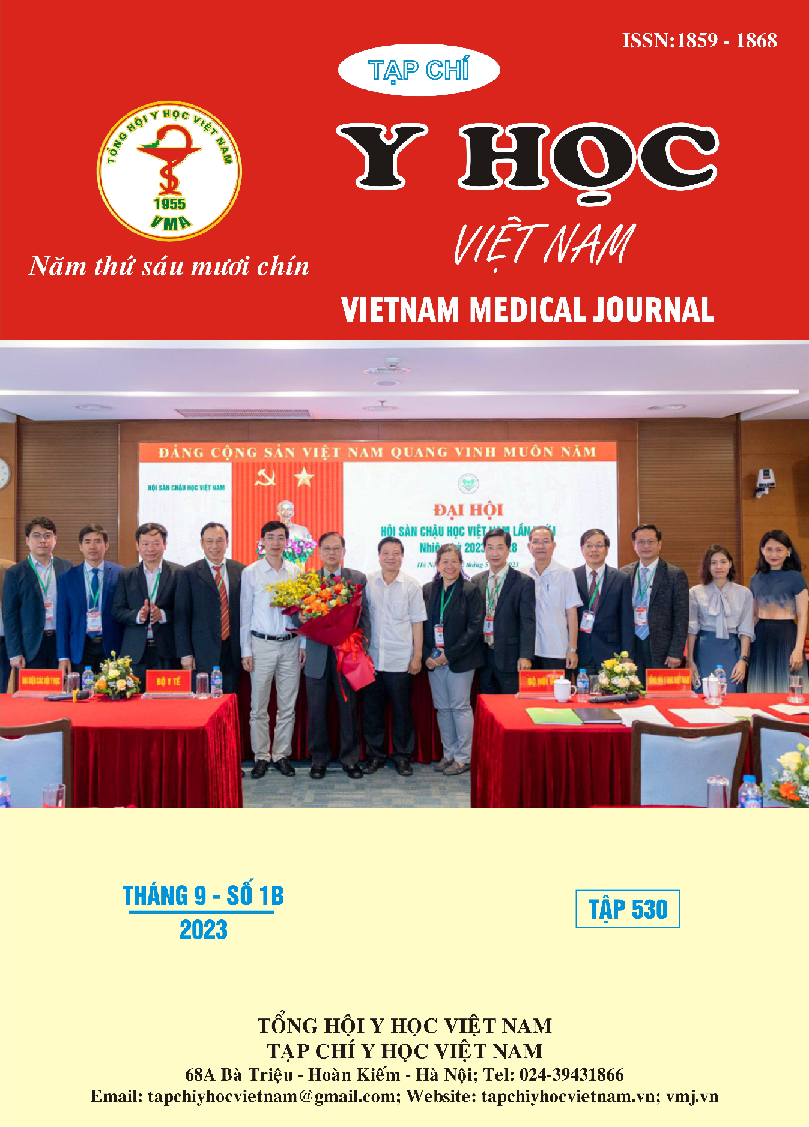SINGLE NUCLEOTIDE POLYMORPHISM RS2304365 OF ST18 GENE AND SOME CLINICAL CHARACTERISTICS IN VIETNAMESE PEMPHIGUS VULGARIS
Main Article Content
Abstract
Objective: To describe the single nucleotide polymorphism variants rs2304365 of ST18 gene and the association of these polymorphism with some clinical characteristics of pemphigus vulgaris in Vietnamese people. Methods: Case series of pemphigus vulgaris patients who came for examination and treatment at Ho Chi Minh City Hospital of Dermato Venereology form March 2023 to June 2023. Patients’ history and clinical examination were collected. Blood samples (2ml) were taken for identified the single nucleotide polymorphism variants rs2304365 at the Biomedical Research Center in Pham Ngoc Thach University of Medicine. Results: Totally 15 patients were recruited. The percentage of genotype CC accounted for 86.7%, genotype CT was 6.7%. The percentage of minor allele T accounts for 10%. Clinical characteristics of pemphigus vulgaris patients: male 26.7%, female 73.3%. 46.7% of patients were in the age of 40-49 years old. 53.3% had an age of onset between 40-60 years old. 13.3% of patients had a family history of pemphigus vulgaris. 20% of patients had triggers, due to drugs and food. 80% patients had pain, 13.3% had itch in their lesions. 86.7% patients had mucosal involvement, 80% had positive Nikolsky. The proportions of patients with severe, moderate and mild disease were 26.7%, 53.3% and 20%, respectively. The duration of treatment response lasts from 10-30 days, 60% of patients respond to treatment within 10-20 days. Conclusion: The study describes some clinical characteristics, genotypes, allenes of the single nucleotide polymorphism rs2304365 of ST18 gene in Vietnamese pemphigus vulgaris patients thereby leading to larger study in the future.
Article Details
Keywords
pemphigus, pemphigus vulgaris, rs2304365, ST18, single nucleotide polymorphism
References
2. Brenner S, Tur E, Shapiro J, et al (2001). "Pemphigus vulgaris: environmental factors. Occupational, behavioral, medical, and qualitative food frequency questionnaire". Int J Dermatol, 40 (9), pp.562-569.
3. Brenner S, Goldberg I (2011). "Drug-induced pemphigus". Clin Dermatol, 29 (4), pp.455-457.
4. James KA, Culton DA, Diaz LA (2011). "Diagnosis and clinical features of pemphigus foliaceus". Dermatol Clin, 29 (3), pp.405-412, viii.
5. Joly P, Litrowski N (2011). "Pemphigus group (vulgaris, vegetans, foliaceus, herpetiformis, brasiliensis)". Clin Dermatol, 29 (4), pp.432-436.
6. Etesami I, Seirafi H, Ghandi N, et al (2018). "The association between ST18 gene polymorphism and severe pemphigus disease among Iranian population". Exp Dermatol, 27 (12),
7. Sarig O, Bercovici S, Zoller L, et al (2012). "Population-specific association between a polymorphic variant in ST18, encoding a pro-apoptotic molecule, and pemphigus vulgaris". J Invest Dermatol, 132 (7), pp.1798-1805.
8. Vodo D, Sarig O, Sprecher E (2018). "The Genetics of Pemphigus Vulgaris". Front Med (Lausanne), 5, pp.226.
9. Yue Z, Fu X, Chen M, et al (2014). "Lack of association between the single nucleotide polymorphism of ST18 and pemphigus in Chinese population". J Dermatol, 41 (4), pp.353-354.
10. Thanh VTB, Thanh LTV (2021). "Biểu hiện HLA-DRB1 và HLA-DQB1 trên bệnh nhân pemphigus". Y học thành phố Hồ Chí Minh, 25, pp.121-128.


